|
|
|
Sort Order |
|
|
|
Items / Page
|
|
|
|
|
|
|
| Srl | Item |
| 1 |
ID:
159465
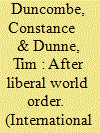

|
|
|
|
|
| Summary/Abstract |
In recent years claims about the end times of the liberal world order have gathered force, with the talk of order giving way to disruption. While there are different accounts of these disruptive dynamics and their causes, it is nevertheless a rare moment in International Relations when all mainstream theories concur that the hegemony of the liberal world order is over and that there is considerable uncertainty about the global architecture that will take its place. Yet claiming that the liberal world order is in trouble is just a starting-point—a deeper account is needed to show how each interrelated element ‘hangs together’. We examine two interrelated patterns to liberal world ordering—internationalism and imperialism. After unpacking each of these interrelated ideas which constitute liberal world order, the narrative will focus on the politics and practice of humanitarianism. Humanitarianism is, of course, deeply intertwined with liberal assumptions about an ethic of care for peoples who are either at risk of, or worse still suffering from, large-scale natural disasters and politically-induced atrocities. Our inference is that the condition of humanitarianism provides a good indication of the state of the liberal world order—its limits and possibilities.
|
|
|
|
|
|
|
|
|
|
|
|
|
|
|
|
| 2 |
ID:
099899


|
|
|
|
|
| Publication |
2010.
|
| Summary/Abstract |
America won an asymmetric war in Iraq and lost an asymmetric peace. Translating material power advantage into favourable political outcomes has been a challenge for great powers down the ages-what makes this bridge even more difficult to cross today is the raised expectations on the part of liberal publics about the moral purpose of US-led interventions. In this sense, Iraq is part of the explanation for why influential liberals believe there is a 'crisis' in America's world leadership. 'America after Iraq' subjects this claim to analytical scrutiny-in particular it addresses whether Iraq was simply a chapter in a longer book detailing American power and purpose in the post-9/11 world? In answering this question the article is drawn to consider conceptual debates about a shift in the international system from anarchy to hierarchy with the US as the hegemonic power. While it rejects strong versions of the hierarchy thesis that imply the Washington is the new Rome, it is nevertheless drawn to an understanding of a hierarchical form of ordering where the US oscillates between a hegemonic role and an imperial outlaw. Seen through this lens, the Iraq War was an intervention that happened because it could, and not because it was just or necessary. Public opinion and the weakness of domestic institutions are also critical factors in explaining how it was possible for a previously status-quo oriented hegemonic power to act recklessly and put the rules and institutions of international society under strain.
|
|
|
|
|
|
|
|
|
|
|
|
|
|
|
|
| 3 |
ID:
145524
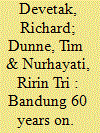

|
|
|
|
|
| Summary/Abstract |
This article examines the extent to which international society has been able to accommodate challenges such as the mid twentieth-century ‘revolt against the West’ and the twenty-first-century rise of new (especially non-Western) great powers. The Bandung conference of 1955 has commonly been seen as posing a threat to the fabric of international society by proliferating cultural and political differences. The authors show, on the contrary, that the political project of anti-colonialism and peaceful coexistence expressed at Bandung was actually consistent with a pluralist conception of international society, even if Western powers and intellectuals at the time failed to notice. The non-Western countries represented at Bandung were intent on expunging international society of the structures and practices of racism and colonialism so as to strengthen the foundations of a pluralistic international society better able to accommodate cultural and political differences.
|
|
|
|
|
|
|
|
|
|
|
|
|
|
|
|
| 4 |
ID:
155156
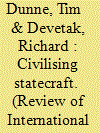

|
|
|
|
|
| Summary/Abstract |
In this contribution to the forum marking the publication of Andrew Linklater’s remarkable book on Violence and Civilization in the Western States-Systems we first locate the book in the context of Linklater’s overarching intellectual journey. While best known for his contribution to a critical international theory, it is through his engagement with Martin Wight’s comparative sociology of states-systems that Linklater found resonances with the work of process sociologist, Norbert Elias. Integrating Wight’s insights into the states-system with Elias’s insights into civilising processes, Violence and Civilization presents a high-level theoretical synthesis with the aim of historically tracing restraints on violence. The article identifies a tension between the cosmopolitan philosophical history which underpins the argument of the book, and which has underpinned all Linklater’s previous works, and the ‘Utrecht Enlightenment’ that offers a conception of ‘civilized statecraft’ at odds with a universal conception of morality and justice. The article then examines Linklater’s argument about the ‘global civilizing process’ as it applies to post-Second World War efforts to build greater institutional capability to protect peoples from harm. It is argued that Linklater over-estimates the extent to which solidarism has civilised international society, and that the extension of state responsibilities and development of civilised statecraft owe more to pluralism than solidarism.
|
|
|
|
|
|
|
|
|
|
|
|
|
|
|
|
| 5 |
ID:
140415
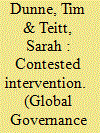

|
|
|
|
|
| Summary/Abstract |
This article examines institutional patterns of leadership and followership in the UN Security Council with respect to the Responsibility to Protect principle. In a departure from existing literature on leadership and followership in international relations, which has hitherto been framed within a realist analysis, the article presents a constructivist account of leadership that sheds light on the strategies and scope of conditions for mobilizing international action to protect populations from mass atrocities. The article applies a theoretical innovation to case studies that examine strategies that India and China adopted in the Security Council to respond to the crises in Libya and Syria from 2011 to 2013. This integration of theory and empirics reveals a complex and layered account of factors that shape the Security Council's ability to exercise its Responsibility to Protect. In doing so, the article demonstrates that followership and leadership are relational practices that create or limit the possibilities for institutional action.
|
|
|
|
|
|
|
|
|
|
|
|
|
|
|
|
| 6 |
ID:
081589
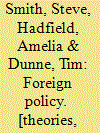

|
|
|
|
|
| Publication |
Oxford, Oxford University Press, 2008.
|
| Description |
xxii, 442p.
|
| Standard Number |
9780199215294
|
|
|
|
|
|
|
|
|
|
|
|
Copies: C:1/I:0,R:0,Q:0
Circulation
| Accession# | Call# | Current Location | Status | Policy | Location |
| 053283 | 327.101/SMI 053283 | Main | On Shelf | General | |
|
|
|
|
| 7 |
ID:
080795
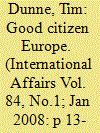

|
|
|
|
|
| Publication |
2008.
|
| Summary/Abstract |
In drafting this article, I benefted from the assistance of a number of colleagues. My writings on internationalism and foreign policy are heavily indebted to the contribution of the following exceptional scholars: Peter Lawler, Andrew Linklater, Paul Keal and Nick Wheeler. More directly, I very much appreciate the input of colleagues in Political Science and International Studies at the University of Queensland, where I have been a visiting scholar: special thanks to Richard Devetak for his insightful thoughts on this topic and comments on a draft, to Marianne Hanson for her conversations on IR over the years and for making the visit possible, and to Frank Mols for his thoughts on citizenship. Thanks also to Jason Ralph for his advice on the legal dimension as well as other useful comments. Finally, I note my appreciation for the guidance and support provided by the editor of this special issue, Lisbeth Aggestam, and the feedback from her team of reviewers
|
|
|
|
|
|
|
|
|
|
|
|
|
|
|
|
| 8 |
ID:
167208
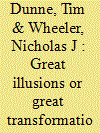

|
|
|
|
|
| Summary/Abstract |
Human rights have been in the practice of international relations, but they have not been central to academic thinking on International Relations (IR) for most of the century since the discipline became institutionalized in 1919. We suggest two related reasons for this relative neglect by the IR community. First, the US heartland of IR prioritized other institutions of international order during the 1950s and 1960s, primarily the balance of power, diplomacy, and arms control. Second, human rights were treated with suspicion by realists in particular given their view that morality in foreign policy was potentially disruptive of international order. If the emergent discipline of IR largely ignored the 1948 Universal Declaration of Human Rights, so did the rest of the world according to the revisionist history of human rights offered by Samuel Moyn. He challenges the idea that the birth of the regime was the culmination of a 150-year struggle that began in the minds of Enlightenment thinkers and ended with a new globalized framework of rights for all. While IR was slow to come to human rights, the pace in the last three decades has quickened considerably; the area of protecting the basic right of security from violence being a case in point, where several IR scholars have been pivotal in the development of action-guiding theory. Developing a critical theme in Carr’s The Twenty Years’ Crisis 1919-1939, we consider whether these institutional developments represent great illusions or great transformations in international relations in Carr’s terms.
|
|
|
|
|
|
|
|
|
|
|
|
|
|
|
|
| 9 |
ID:
075555
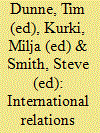

|
|
|
|
|
| Publication |
Oxford, Oxford University Press, 2007.
|
| Description |
xxii, 350p.
|
| Standard Number |
0199298334
|
|
|
|
|
|
|
|
|
|
|
|
Copies: C:1/I:0,R:0,Q:0
Circulation
| Accession# | Call# | Current Location | Status | Policy | Location |
| 052057 | 327.101/DUN 052057 | Main | On Shelf | General | |
|
|
|
|
| 10 |
ID:
137634
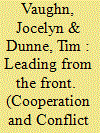

|
|
|
|
|
| Summary/Abstract |
The United States has historically been inconsistent and ambivalent about the responsibility to protect. Part 1 of the article sets out a theoretical framework for understanding how the United States aligns itself with the responsibility to protect; it does so by initially using the idea of norm localisation, which reveals important convergences and tensions between the international norm and the localised variant that we call ‘genocide and mass atrocity prevention/protection’. Part 2 looks at the impact of this norm innovation in relation to the position that the United States government adopted on Libya – suggesting that it played a critical leadership role in the crisis and in doing so took risks with its international reputation while knowing that there was little prospect that this action would be warmly greeted by Congress or domestic public opinion.
|
|
|
|
|
|
|
|
|
|
|
|
|
|
|
|
| 11 |
ID:
087475
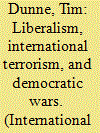

|
|
|
| 12 |
ID:
107227
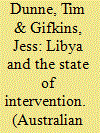

|
|
|
|
|
| Publication |
2011.
|
| Summary/Abstract |
The international response to the crisis in Libya has been remarkably quick and decisive. Where many other cases of mass atrocity crimes have failed to generate sufficient and timely political will to protect civilians at risk, the early response to Libya in 2011 has shown that the United Nations Security Council is able to give effect to the 'responsibility to protect' norm. While not an implementing party in a legal sense, the Australian government has taken a forward-leaning diplomatic stance in helping to mobilise broad support for addressing this crisis. In light of the ongoing political controversy over armed humanitarian intervention, the Libya case shows that state-based advocacy for R2P matters, given the on-going need to bolster the legitimacy of the principle. A discussion of Canberra's diplomatic activity is a prelude to an examination of the proceedings of the UN Security Council and the two key resolutions, the second of which gave effect to the forcible action. The article then considers three dimensions of the Security Council's implementation of the responsibility to protect: the language of the resolutions and the intriguing absence of a textual reference to the international community's responsibility to act; the expansive mandate for civilian protection in Security Council resolution 1973; and the first unanimous referral to the International Criminal Court, with novel support from the United States of America.
|
|
|
|
|
|
|
|
|
|
|
|
|
|
|
|
| 13 |
ID:
077888
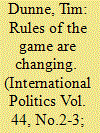

|
|
|
|
|
| Publication |
2007.
|
| Summary/Abstract |
Is there a crisis of legitimacy in relation to fundamental human rights commitments? At one level, the human rights regime has endured legitimacy problems from the outset, in part due to the scope and complexity of the standards but also as a result of the unwillingness of states to regard human rights norms as properly binding. I argue that September 11 and the responses this event triggered in the foreign policies of leading states in international society have taken the challenge to the regime to a new level. What makes it a crisis of legitimacy is the fact that those were crucial to the emergence of the regime, and the rights that are under siege are core 'rights of the person' and not aspirational rights. The closing discussion examines the possibility for a restoration of legitimacy. Consistent with the earlier theoretical discussion, the question of whether and how the legitimacy crisis can be resolved requires a differential response, depending on the site of the crisis, and the location of the audience. The concepts of international and world society provide analytical leverage in identifying both the causes of the crisis and the prospects for its resolution
|
|
|
|
|
|
|
|
|
|
|
|
|
|
|
|
| 14 |
ID:
051559
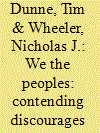

|
|
|
| 15 |
ID:
057630
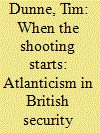

|
|
|
|
|
|
|
|